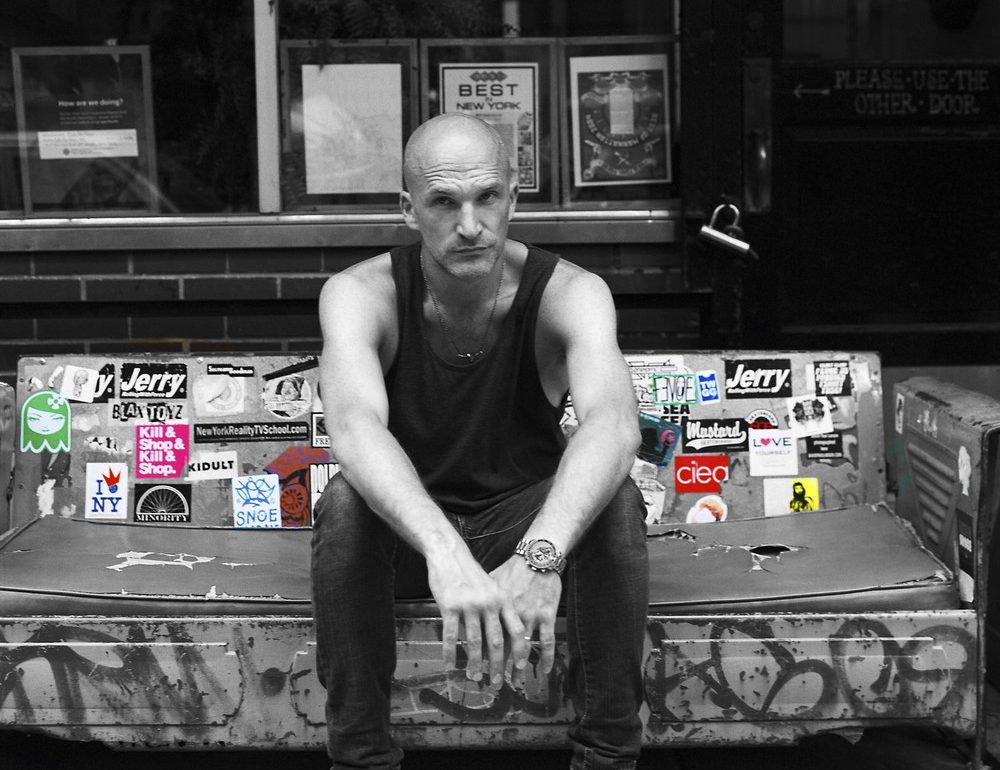“You can’t reverse the flow of a river, but I’d like to see social media play less of a role in terms of who gets attention and why”
Interview by Arnold van der Walt
He has been in the music business since before many of today’s producers have even been born. Theo Keating, also known as Fake Blood and Touché, is a British producer, musician and DJ who have worked with the likes of Armand van Helden, Hot Chip, Miike Snow, The Kills, Calvin Harris and more. Known for being able to adapt to any genre like a chameleon, Fake Blood exploded unto the scene with his 2009 release, ‘I Think I Like It’ which currently boasts more than 32 million streams on Spotify alone and has been featured in countless forms of media including the Zac Efron film We Are Your Friends.
Initially releasing on Herve‘s Cheap Thrills label and PIAS imprint Different before moving to his own Blood Music and then Kry Wolf and Shadow Child’s Food Music, the Fake Blood sound incorporates cavernous bass, crisp samples and rolling breakbeats. Raw and direct, he recently (22 Feb 2019) released a brand new EP as Fake Blood via Bingo Bass that include two new sure-fire hits, namely ‘The Fear’ and ‘Garms’.
Filled with Fake Blood‘s signature electro stylings, this brand new EP doesn’t shy away from venturing into breakbeat beats either. ‘The Fear’ is unapologetic and in your face; just the way any opening track should be. This track is sure to find it’s home in the dark and late night underbelly of the underground electronic music scene. Moving along to ‘Garms’, the track takes a lighter approach than its dark predecessor. Being lighter in sound does not mean that the track has any less of a punch; ‘Garms’ is all about the groove, the feeling you get while enjoying your favourite music.
We sat down with Fake Blood and spoke about his brand new EP release, the rise of the toxic DJ and getting your fingers dirty discovering new music.
Hi Fake Blood! Thank you so much for taking the time to speak with us. Before we get going, what have you been up to lately?
I took some time off – away from music. Sometimes it’s good to know when to step back and pause. I wanted it to feel fun again. Which it does! So I’ve been making lots of new music.
With roots in house and electro, to those not familiar with you, how would you describe your dynamic sound?
It’s impossible to be objective about how one’s own music sounds – but everyone who knows me says they can spot one of my tunes within the first few bars. And I have no idea why that is! I guess I approach making dance music from the perspective of someone who grew up learning to make hip-hop, and who is completely into record digging and sampling. So that sensibility is throughout everything I make – the way I do my drums, the unusual samples and sounds I use. And it’s also the sound of someone who has worked alone for many years – so all the idiosyncrasies, mistakes and odd habits don’t get corrected – they just keep warping further!
You recently released a brand new EP; what can you tell us about it?
I’d been making very different music for a while, very much under the radar, but I felt the urge to make something as Fake Blood again. And this is what resulted. The tracks went through a few different incarnations before they felt right. When I was happy with them I approached Zinc, and he was into releasing them on Bingo. Happy days.
More specifically, what can you tell us about ‘The Fear’?
Occasionally I like to make a dark tune. This is one of those occasions. Ripples and waves of unease over textured layers of chopped drums. Fun with Fear!
and ‘Garms’?
We all like our garms. And tuned 808’s.
Take us through your songwriting process. Are there any particular steps you take when putting music together?
I don’t make music in a linear way – writing/programming each part as I arrange the track and the need arises (although I’m mildly jealous of those who do). My approach is more like Lego – I gather all my bricks (colour-coded naturally), and then build. And when I’m finished there may well be parts I didn’t end up using, which can maybe find life in the next tune. Some sort of sample is usually the starting point, which I chop and alter til I have something I can build around. Then come the drums – very important. And then come the other layers – bassline, synths, various riffs and fills etc. Often though that original starting sample may end up buried in the track, or splintering off to make another tune, or even in the bin. It’s just my way of making a mark on a blank page – to get going.
Gary Numan is quoted as saying: “I have always been far more interested in sound than technique, and how sounds work together, how they can be layered. I think electronic music, (in its infancy anyway) allowed us to create music in a way that hadn’t really been possible before. It created a new kind of musician.” What are your thoughts on this statement?
When electronic instruments first became available widely, they were usually complex and intimidating and could be really expensive, and therefore didn’t seem as accessible as a guitar to your average amateur musician or songwriter. So only certain people were drawn to them, in search of new sounds and ways to make music, often by taking those keyboards and modules in directions they weren’t originally intended for. The TB-303 being a perfect example. So that era from the mid-’70s into the mid-’80s really did give rise to a new kind of musician. Explorers even! And Gary Numan was definitely one of those people.
Studio work and music creation or performing and interacting with a live audience, which do you prefer?
Both. One hand washes the other. They stimulate completely different parts of the brain. It’s great to make a tune that you think will get a good reaction, but it’s vital to see that reaction too! And if it’s not there then you get to go back and change the tune (or bin it). They can both be fantastic, stressful, joyful, difficult, and should both feel like you’re working not coasting.
You’ve been in the industry for a while now and have experienced it as a music producer, musician and a DJ. What would you say has been the biggest change throughout the years?
The rise of the DJ as a celebrity/brand. Toxic.
Is there anything you would like to see change/improve about how the industry operates?
You can’t reverse the flow of a river, but I’d like to see social media play less of a role in terms of who gets attention and why. Because nowadays the self-generated hustle seems to overshadow the importance of how good the tunes are, or how well you play. You have to be a sort of one-man PR microbrand – which is boring and time-consuming, and takes away from the actual creative aspects.
Any new artists on your radar? Is there a sub-genre you feel is often overlooked?
Not really. Cos there is good stuff everywhere if you look for it. There are always amazing tracks that are overlooked. You just have to search in all sorts of genres, all the b-sides, all the mixes. Looking for tunes to play out is a bit like digging for old vinyl – you have to look in the whole store A to Z, every genre. Get dirty fingers. That’s how you find the gold! Or you can just stay in your lane – but where’s the fun in that?
Apart from the release of ‘The Fear / Garms’, what else can we expect from Fake Blood in the near future?
I never have any sort of grand plan. I’ve always just made it up as I go along! So I guess I’ll make some tunes, get them released, and then see what happens next.
Thank you so much for taking the time to speak with The Playground; before you go, what are your famous last words…
Feeling a bit superstitious today so I might leave this bit blank…
Follow Fake Blood:
Website // Facebook // Twitter // Soundcloud // Instagram // Spotify



